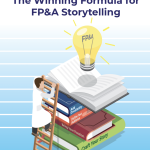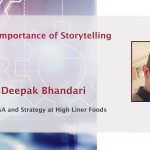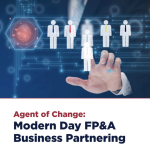In this article, the author compares business storytelling with fairytales, emphasising that we can inspire actions...

I often get asked what it takes to be an effective finance Business Partner.
I joined Anglian Water just over a year ago, and I knew the most important challenge for me was to earn my seat at the table and to gain trust fast. As a trusted advisor to the Director of Water at Anglian Water, it is my role to guide the water leadership team to make great decisions and drive action for today and tomorrow.
A wise man once said to me,
"Change happens at the speed of Trust".
So, what did I do to "supercharge" the trust? Everything started when I asked myself: "How do I show up to the business"?
- As a listener
- As a thought provoker
- When landing key messages
- Showing my human side
- Staying relevant
In this article, I am going to focus on the first two points, reflecting on how I show up as a listener and asking great questions to provoke thoughts. It helped me to earn trust quickly and become a more impactful Business Partner.
Listening
Have you ever heard that saying:
"You have two ears and one mouth, use it that way"?
It's true. When people truly feel listened to, they feel heard, respected, and cared for. They engage. It sounds basic, but still, so many of us are average listeners.
Whenever people are asked what makes Business Partners stand out, the answer "they were great listeners" is always at the top. As a Business Partner, I've been able to understand the business's concerns better, pick up on body language, ask thought-provoking questions, and get better outcomes. So, how has self-awareness helped me as a listener?
Over the past two years, I've spent a lot of time learning about myself, my preferences and how I typically interact with others. Here is what I have learnt.
-
Distraction
I get distracted. I don't think I am alone. We've all been in those one-to-one meetings when the other person is distracted. A phone notification, an email, or an MS Teams message. I've learnt to close the laptop screen, turn the phone over, move your chair to face the person, and make them feel important!
I'd really challenge you to notice how you are getting distracted in your next meeting, particularly an MS Teams meeting. It is so easy to think, "I'll just check that message". Before you know it, you didn't properly hear what was said, so you would have to either apologise and ask them to repeat or guess what the missed part was about.
-
Take Notes
When someone has a catch-up meeting, I always feel they take it seriously when they turn up with their book or pad and make notes. It gives the impression that they care and are more likely to take action. Making notes helps me in three ways:
- It shows I'm listening.
- I can use the notes to confirm actions and that I've been understood.
- I'm more likely to retain the information and have it as a backup if I forget.
-
Don't Take Over
As an extrovert and a "yellow" personality, I prefer talking. But when I am talking, I am not listening. It's reality. I need to dial down the talking and let the other person speak.
I know I am prone to interrupting, and I've had to learn to control that. I've learnt to notice the "urge" to open my mouth. As a self-confessed "people pleaser", I just want to help, but I end up going into problem-solving mode and "taking over" the conversation from my Business Partner.
-
Stop Assuming
I've been told that I am good at reading body language and emotions, but sometimes I forget that I am not a mind reader. Yes, I pick up on things, especially the non-verbal cues. However, sometimes, I may assume I know what they think by their body language. In short, I may assume something wrong, and it turns into a dangerous game. I've had to learn not to assume; instead, it would be better to "check in" with them about it. I don't assume anymore.
Another part of being a good listener is asking great questions.
-
Open Questions
People often comment about how I ask "thought-provoking questions". Being naturally curious helps, but it's something I've worked hard on over the last 12 months. When I know I need to be in a "challenge" mode, I consciously think about what kinds of questions would have the most impact. For example, if I am challenging assumptions, I ask questions such as "What would need to be true to hit that cost reduction?" or "What would be the reasons to believe in something?" I also ask questions for others to think about how we may be challenged from our stakeholders. "If we were presenting to X, how do we think they are likely to react?" or "What information do we think they would need?" From my experience, I've learnt that it's not just what you say; it is HOW you say something.
-
Avoid Why
We've all heard about the "Five Whys". I completely agree with the strategy of answering five questions to get to the root cause of something. But I have found that sometimes using "Why" can come across as too direct, particularly if you are dealing with people with "yellow" and "green" personalities. I've found a softer approach that sounds like "that is really interesting, and it would be great to understand your thought process" often works better.
-
Notice Your Triggers
Becoming more self-aware has helped me to realise when I am wandering off into asking "closed" question danger zone. My triggers are stress, high pressure and shortage of time. You know how complex situations can be! You need an answer right now! Sometimes, closed questions have a place, but being aware of when they are really appropriate has helped me have more impact.
-
Get Comfortable with Silence
As a talker, I've often found silence uncomfortable. I've had to get used to the silence. I've learnt how important silence can be to other people. Giving them space to think and respond is crucial, particularly for those who must reflect. Next time you are listening to someone, try it out!
Conclusions
So, next time you meet with your Business Partner, I challenge you to recognise and avoid your distractions, take notes, understand when you are taking over, think over some open questions in advance, detect if you start asking closed questions and try building some silence there! Then, reflect on how it made a difference!
Subscribe to
FP&A Trends Digest

We will regularly update you on the latest trends and developments in FP&A. Take the opportunity to have articles written by finance thought leaders delivered directly to your inbox; watch compelling webinars; connect with like-minded professionals; and become a part of our global community.







